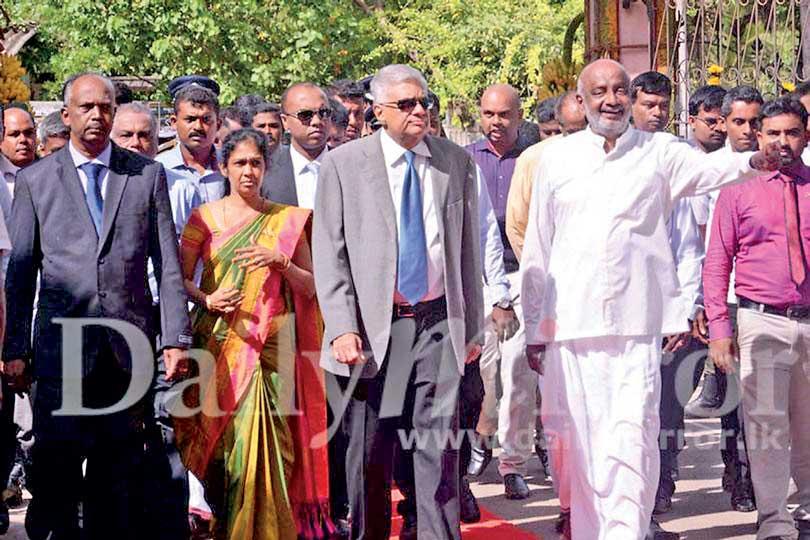Reply To:
Name - Reply Comment
Last Updated : 2024-04-25 20:04:00
Sri Lankan Tamils have lost their bargaining powers -- India and the LTTE. India had officially repudiated the Indo-Sri Lanka Accord two and a half years ago

 When Prime Minister Ranil Wickremesinghe who was in the north last week, told the gathering at an event held to mark the 125th anniversary of the Kandarodai Skandavarodaya Vidyalayam in Chunnakam that a lasting political solution to the ethnic problem would be provided within the next two years, he most probably might have believed that Tamils were elated with his promise. But alas, nobody seemed to have taken him seriously.
When Prime Minister Ranil Wickremesinghe who was in the north last week, told the gathering at an event held to mark the 125th anniversary of the Kandarodai Skandavarodaya Vidyalayam in Chunnakam that a lasting political solution to the ethnic problem would be provided within the next two years, he most probably might have believed that Tamils were elated with his promise. But alas, nobody seemed to have taken him seriously.
Almost all Tamil politicians who had expressed their views on it in the Tamil media had contemptuously rejected it as a bluff. They were not the supporters of the Sri Lanka Podujana Peramuna (SLPP) led by former president Mahinda Rajapaksa or the opponents of the Prime Minister, but were well aware that there is no political environment in the country that would enable the Prime Minister to introduce drastic changes to the relevant laws in two years.
Mr. Wickremesinghe rightly said at the Kandarodai meeting that his government failed to bring about a lasting solution to the ethnic problem because of not having the necessary two thirds majority in Parliament. The government converted the Parliament into a Constitutional Assembly in January 2016 and that assembly in turn appointed six Sectoral Committees and a Steering Committee to draft a new Constitution under which a new scheme of devolution of power was also envisioned. However, the process has stalled for want of the sufficient parliamentary support and owing to the turbulent events that changed the entire political landscape in the meantime.
Tamils, who for the past six decades have been demanding for the devolution of more powers to their areas which have a predominantly Tamil population, believe that it can be achieved only through a drastic change in the Constitution. The United National Party (UNP) led by Ranil Wickremesinghe had no power to promulgate such Constitutional amendments for the past four years nor would it be likely to obtain such power at the next parliamentary elections.
Therefore, good intentions apart, the Prime Minister’s promise is doomed to be a damp squib and Tamils are not so gullible as to not know the political situation in the country. Besides, the government and the leaders of the Tamil National Alliance (TNA), through their proposals included in the interim report of the Steering Committee presented in Parliament in November 2017 had only sought to rename Sri Lanka as Orumittha Nadu/Aekeeya Ragyaya, without improving on the mechanism of power devolution.
It is noteworthy that he had made this pledge in July, the month in which hundreds of Tamils were murdered all over the country 36 years ago in a State-sponsored pogrom and they were also awarded the only solution in the history to the ethnic issue, 32 years ago -- both under a UNP government in which Mr. Wickremesinghe was a minister.
The anti-Tamil pogrom in the last week of July, 1983 which is generally called “Black July” was a most significant milestone in the Tamils’ fight for self rule, in many aspects. It was the incident that turned their armed struggle from isolated killings of security personnel by dozens of Tamil armed groups to an internal war, by pushing thousands of Northern and Eastern youth to join those groups. This facilitated and legitimized the meddling into Sri Lanka’s internal affairs by our northern neighbour India which was awaiting such an opportunity because of the power struggles that then prevailed in the region.
The Black July drew international attention towards the Tamils’ grievances. And India’s highhanded fingering began with the July 1983 incidents compelling the government of President J.R. Jayewardene, who had rejected all suggestion for talks with the Tamil armed groups thus far to do so. Thus the search for a political solution began first through a Round Table discussion with all political parties in 1984 and through the Political Party Conference (PPC) in 1986 in which the Sri Lankan government accepted, for the first time, the concept of power devolution. Finally, a bullying India took the matter into its hands to impose the provincial council system on Sri Lanka, through the famous “Indo-Sri Lanka Peace Accord” signed on July 29, 1987.
Despite the Sri Lankan leaders never genuinely wanting to devolve powers to the Tamil-dominated areas in the North and the East, they were compelled to take measures to stop the bloodshed by talking to the Liberation Tiger of Tamil Eelam (LTTE) led by Velupillai Prabakaran, the only armed group which did not lay down weapons following the Indo-Sri Lanka Accord.
President Ranasinghe Premadasa went to the extent of providing the LTTE with weapons, cement and money to appease them. President Chandrika Kumaratunga was prepared to hand over the Northern and Eastern Provinces to the LTTE for ten years, believing that the rebels would come to terms with the State, at least after such a long period. She also included this suggestion in her draft Constitution presented in Parliament on August 3, 2000.
In 2003, Professor G.L. Peiris, on the instructions of Prime Minister Ranil Wickremesinghe, agreed to discuss the LTTE’s proposal for the Interim Self-Governing Authority (ISGA) for Northern and Eastern Provinces, which was a blueprint for a separate State in those two provinces. President Mahinda Rajapaksa caved into LTTE pressure to remove the Muslim representation from the government delegation to the peace talks with the outfit in 2006.
These were missed opportunities for the Tamils to strengthen self rule provided through the provincial council system, apart from the Indian intervention after the Indo-Sri Lanka Accord of 1987 as well. Given the fact that India successfully persuaded President Jayewardene to administratively merge the Northern and Eastern Provinces, it could be inferred that Indian leaders would also have pressed the Sri Lankan leaders to sign the relevant gazette to create a provincial police force, in line with the Indian State police force, had the presence of its armed forces, the Indian Peace Keeping Force (IPKF) prolonged.
However, Tamils missed all these opportunities owing to the intransigence of the LTTE. Prabakaran never realized the geo-politics of the region and the clear fact that India would never allow the creation of a separate Tamil State adjacent to its southernmost State of Tamil Nadu which is home to more than sixty million Tamils.
Now, Tamils in Sri Lanka have lost both their bargaining powers -- India and the LTTE. India had officially and unambiguously repudiated the Indo-Sri Lanka Accord, two and a half years ago. The then Indian Foreign Secretary S. Jaishankar during his three-day visit to Sri Lanka told the Eelam Peoples’ Revolutionary Liberation Front (EPRLF) on February 22, 2017 that India would not be pressing Sri Lanka to merge the Northern and Eastern Provinces to form a single Tamil-majority, Tamil-speaking province as envisaged by the Accord.
Jaishankar had told EPRLF leader Suresh Premachandran that much water had flowed under the bridge since 1987 and it would be better for all concerned to make use of the various windows of opportunity which have opened up recently with the change of regime in Colombo and secure the rights of the Tamils. The message is very clear -- leave us alone.
Now, the Tamils have neither India, nor the LTTE and without the power to pressure the government and with no better suggestions for power devolution. So they are left with the options of putting up with the current provincial council system or improving on it. However, they, as the case with the LTTE, have failed, due to their intransigence to use the PC system to improve the lives of the people, instead of using it just for political propaganda.

Add comment
Comments will be edited (grammar, spelling and slang) and authorized at the discretion of Daily Mirror online. The website also has the right not to publish selected comments.
Reply To:
Name - Reply Comment
US authorities are currently reviewing the manifest of every cargo aboard MV
On March 26, a couple arriving from Thailand was arrested with 88 live animal
According to villagers from Naula-Moragolla out of 105 families 80 can afford
Is the situation in Sri Lanka so grim that locals harbour hope that they coul